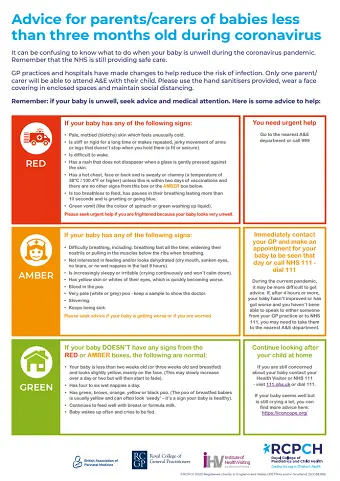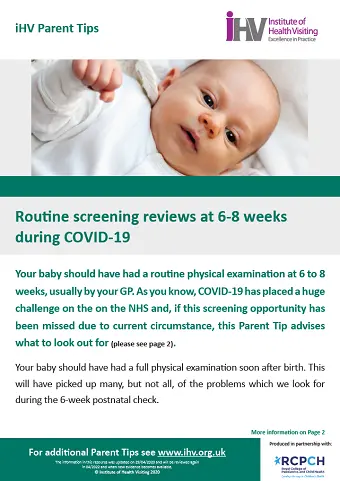Paediatricians, health visitors and GPs have joined forces to produce guidance for parents who are worried about their new baby.
The Royal College of Paediatrics and Child Health (RCPCH) has joined forces with the British Association of Perinatal Medicine (BAPM – part of the RCPCH), the Institute of Health Visiting (iHV), and the Royal College of General Practitioners (RCGP) to produce a ‘fridge’ poster which signposts when and where parents should seek help for babies aged three months and under.
Over the summer, paediatricians reported that a small number of children may have become seriously ill because of delays in accessing health services*. Health professionals are concerned that such delays could happen again this winter as some paediatricians are reporting seeing far fewer children than they would have expected.
Parents may not know they are still able to have face-to-face consultations, may find it difficult to get an appointment quickly when worried, or may be concerned about COVID transmission. Added to this, new parents in some parts of the country have not had the usual access to health visitors (many of whom were redeployed into other roles during the pandemic), and lockdowns have meant some have not been able to see their extended families, friends and other parents.
Dr Helen Mactier, President of BAPM, said:
“Being a new parent can be daunting at any time, but having a new baby during a pandemic can throw up a lot of additional challenges for many families – even more so under lockdown.
“Many parents haven’t had the usual access to routine face-to-face appointments with a healthcare professional or been able to discuss a change in their baby’s appearance or behaviour with other new parents or their own friends and family. That can be really worrying.
“We want to let parents know what should or shouldn’t be of concern with regard to their baby’s health, and to put their minds at rest that the NHS is here for them if their baby is unwell.”
Dr Cheryll Adams, Executive Director of the Institute of Health Visiting, said:
“We’re delighted to support the publication of these new information posters and will be distributing them widely to health visitors and parents. COVID-19 has shone a light on the challenges for new parents who may not be sure whether a change of behaviour or appearance in their new baby suggests that they are unwell. These posters make clear when they should seek help which will be very reassuring.”
Professor Martin Marshall, Chair of the Royal College of GPs, said:
“Children rarely become ill with COVID-19 but there are other conditions which can be serious if left untreated. We want parents of young children to seek medical help when they are concerned about the health of their child – and to know that despite lockdown restrictions, general practice services are available, although they might be delivered in a different way than usual. Where necessary, face-to-face appointments will be facilitated in as safe a way as possible. This guidance will help people to decide when they should get help as well as when they don’t need to worry.”
*https://adc.bmj.com/content/early/2020/11/02/archdischild-2020-320565
https://adc.bmj.com/content/early/2020/06/24/archdischild-2020-319848





